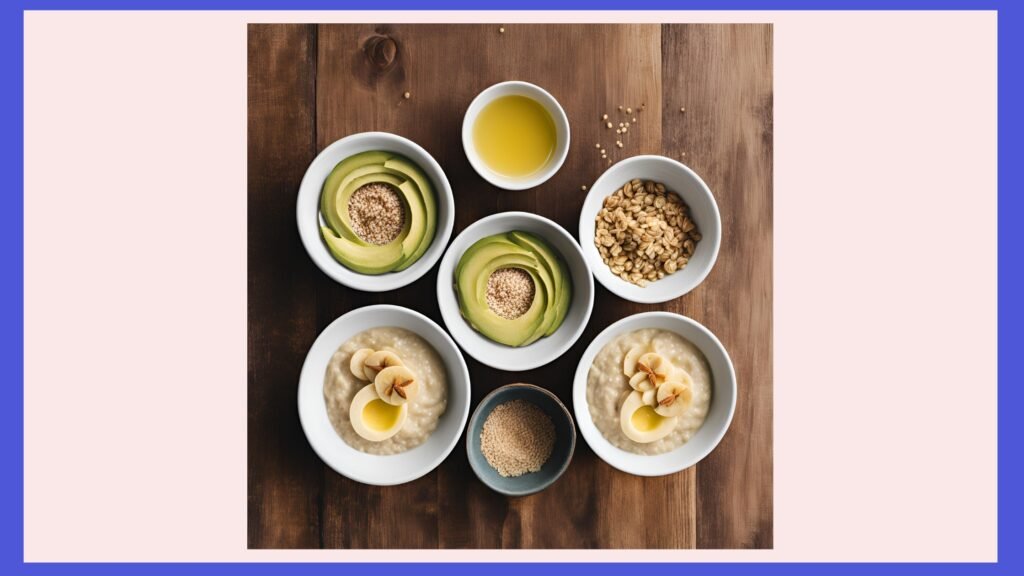
Baby Weight Gain Foods by Age (0–3 Years)
Topic
Baby Weight Gain Foods by Age (0–3 Years)
May start as early as
1 months
─────────
Weight is a fundamental indicator of your baby’s progress. This means that a steady and healthy appropriate weight suggests that the infant is receiving adequate nourishment. Therefore, recording the weight of a newborn in a specific period is important. Since it enables parents to spot abnormalities in babies at an early stage, allowing remedial actions to be implemented. So, in this Baby weight gain food blog, we will discuss Baby Weight Gain Foods. This will help you guarantee your kid receives the finest nutrition available.
Tiny tummies, big needs! See the ultimate 0-3 baby food chart and must-have nutrients now!
FREE Baby Weight Gain App for 0-3 Year Old – DOWNLOAD NOW
In this blog we will cover-
- Weight Chart for 0-36 months babies
- Weight gain and development
- Signs of unhealthy weight
- Weight gain foods

Uptodd baby cereal is Live Now !!
Weight Chart for 0-36 months
Your baby’s growth can be tracked using a standard weight chart from birth to 3 years. These charts help parents monitor healthy progress and quickly identify if their child’s weight gain is on track or needs medical attention.
| Age (months) | Boy (kg) | Girl (kg) |
|---|---|---|
| 0 | 2.5–4.3 | 2.4–4.2 |
| 1 | 3.4–5.7 | 3.2–5.4 |
| 2 | 4.4–7.0 | 4.0–6.5 |
| 3 | 5.1–7.9 | 4.6–7.4 |
| 4 | 5.6–8.6 | 5.1–8.1 |
| 5 | 6.1–9.2 | 5.5–8.7 |
| 6 | 6.4–9.7 | 5.8–9.2 |
| 7 | 6.7–10.2 | 6.1–9.6 |
| 8 | 7.0–10.5 | 6.3–10.0 |
| 9 | 7.2–10.9 | 6.6–10.4 |
| 10 | 7.5–11.2 | 6.8–10.7 |
| 11 | 7.4–11.5 | 7.0–11.0 |
| 12 | 7.8–11.8 | 7.1–11.3 |
| 13 | 8.0–12.2 | 7.3–11.6 |
| 14 | 8.2–12.6 | 7.5–11.9 |
| 15 | 8.4–13.0 | 7.7–12.2 |
| 16 | 8.6–13.3 | 7.9–12.5 |
| 17 | 8.9–13.7 | 8.1–12.8 |
| 18 | 9.1–14.0 | 8.3–13.1 |
| 19 | 9.3–14.4 | 8.5–13.4 |
| 20 | 9.5–14.7 | 8.7–13.7 |
| 21 | 9.7–15.0 | 8.9–14.0 |
| 22 | 9.9–15.3 | 9.1–14.3 |
| 23 | 10.1–15.6 | 9.3–14.6 |
| 24 | 10.3–15.9 | 9.5–14.9 |
| 25 | 10.5–16.2 | 9.7–15.2 |
| 26 | 10.7–16.5 | 9.9–15.5 |
| 27 | 10.9–16.8 | 10.1–15.8 |
| 28 | 11.1–17.1 | 10.3–16.1 |
| 29 | 11.3–17.4 | 10.5–16.4 |
| 30 | 11.5–17.7 | 10.7–16.7 |
| 31 | 11.7–18.0 | 10.9–17.0 |
| 32 | 11.9–18.3 | 11.1–17.3 |
| 33 | 12.1–18.6 | 11.3–17.6 |
| 34 | 12.3–18.9 | 11.5–17.9 |
| 35 | 12.5–19.2 | 11.7–18.2 |
| 36 | 12.7–19.5 | 11.9–18.5 |
This is a weight chart which shows the normal weight range for 0-36 months of age. Moving forward let’s now see how weight and development are linked.
Weight gain and development
Baby weight gain is important to a baby’s development since it is a reflection of their feeding and growing progress. In the first year, infants grow rapidly, and weight gain is one of the main aspects of infant health and infant development.
Weight and Physical Development
Weight growth is a crucial aspect in a child’s physical health because it promotes the appropriate development of key organs, muscles, and bones. With increased body mass, an infant’s bodily strength is maintained at a suitable level, allowing for age-appropriate motor development such as sitting, crawling, and ultimately walking. Furthermore, it helps reinforce the body’s defense mechanism, as a result, reducing the risk of illnesses. Proper weight also provides infants with energy to carry out the daily activities and helps in growth.
Weight and Cognitive growth
However, weight gain should be viewed as an equally major component when considering your baby’s growth and brain development as well. It ensures that there are adequate amounts of good fats and proteins, which are critical for brain development. A proper diet also helps to improve memory, understanding, and thinking skills. Furthermore, maintaining a healthy body weight helps to construct brain pathways. These are required for language acquisition, social skills, and sensory information processing. In addition, encouraging a healthy weight range ensures that your baby’s brain develops and functions optimally.
Signs of unhealthy weight
In the first twelve months of life, a baby’s weight can be dynamic. Most of the energy is spent on physical as well as developmental changes. Even though some changes in weight are normal, it is important to keep a watch on the weight of a baby. As some signs may indicate a problem, pay attention and call your pediatrician when necessary. Here are some important signs of unhealthy weight gain or loss to watch for during this rapid growth stage.
Consistently Poor Weight Gain: baby weight gain food
If your infant is not gaining weight as expected, it may indicate a problem with their nutrition or feeding habits.
Excessive Weight Gain
If your kid is gaining weight too quickly, it may signal overfeeding or a nutritional imbalance, which could lead to health issues later in life.
Signs of dehydration
They include a lack of wet diapers, sunken eyes, and dry skin, which can indicate that your baby is not getting enough fluids, affecting their weight and overall health.
Visible signs of malnutrition
This includes dry, flaky skin, sparse hair, and a pale complexion, which may suggest nutritional deficits that impair your baby’s weight and development.
Failure to Meet Growth Milestones
If your infant is not meeting developmental milestones such as sitting, crawling, or standing despite adequate weight gain, this may indicate underlying health issues.
Visible Fatigue or Lethargy
If your kid appears excessively fatigued, sluggish, or lethargic, it could be an indication of malnutrition or an imbalance in energy intake.
Now it is time for us to talk about Weight gain foods
Baby Weight gain food
Let’s talk about baby weight gain food to ensure your little one gets the right amount of nutrition which facilitates their weight gain:

Breast Milk
Breastfeed your newborn infant after every 2-3 hours. Generally, parents tend to divide breastfeeding under 6 months of age babies. Breastfeeding is believed as one of the most nutritious foods that helps in weight gain process for babies. Until they transition to solid food, provide them with breastfeed or formula only.
Banana
This fruit doesn’t need to be supplemented with any other food. Pediatricians approve mashed banana as a food for baby weight gain. It is also a great travel snack. Bananas are rich in healthy fats, fiber, and potassium. They also provide calcium, iron, magnesium, phosphorus, and manganese. Additionally, bananas contain vitamins A, B, C, D, and K.
Avocado
Avocados are also good for babies. Its composition has healthy fats and a non intrusive flavor making this food beneficial to babies aged six to nine months who need to gain weight. One of the solid foods that help in baby weight gain; pediatric nutritionists often recommend avocado.
Olive Oil
Compared to the four calories found in a gram of protein or carbohydrate, each gram of fat contains about nine calories. One good option is the plant-based olive oil; try drizzling a teaspoon on pureed vegetables for an extra boost.
Oatmeal
Oatmeal is one of the best baby food options with regards to healthy weight gain. It contains complex carbohydrates, fibers and nutrients which are very helpful in filling and nourishing your child. Fiber in oatmeal aids the digestive process while the carbohydrate gives more sustained energy which is beneficial in the growth and development process.
Reference- Baby weight gain foods, Nutrition and Foods
Baby Weight Gain Foods by Age
Lets understand at different age what you can do for right baby’s weight.
Weight Gain & Breastfeeding Tips
Even in the first few months, breastfeeding plays a vital role in baby weight gain. A proper latch, feeding frequency, and maternal nutrition directly affect growth patterns. If your newborn or infant is struggling to gain weight, breastfeeding adjustments can make a big difference.
👉 Learn more here: Weight Gain & Breastfeeding Tips
Newborn to 5 Months: Weight Gain Tips
Newborns gain weight mainly from breast milk or formula. Most babies should gain 600–1000g per month in the first 3 months. Focus on frequent feeds, proper latch, and monitoring growth using charts. If weight gain seems slow, consult your pediatrician.
👉 Read more: Newborn Weight Gain Tips
6 Month : Starting Solids for Healthy Growth
At around 6 months, babies can begin complementary foods along with breast milk or formula. Start with mashed banana, dal puree, rice cereal, mashed potato, and ghee-enriched khichdi. Introduce one food at a time and monitor for allergies.
👉 Explore: Weight Gain Foods for 6-Month Baby
6 – 12 Months: Building Calorie-Dense Meals
Between 6–12 months, weight gain comes from calorie-rich solids + continued breastfeeding. Include ragi porridge, avocado mash, paneer cubes, eggs (if no allergy), yogurt, and vegetable khichdi with ghee. Offer 3–4 small meals daily alongside milk feeds.
👉 Learn more: Baby Weight Gain (6–12 Months)
12–24 Months: Foods for 1-2 Year Olds
Between 1-2 year, your baby can eat most family foods with minor modifications. Great weight gain foods include paneer, cheese, nut pastes, avocado, scrambled eggs, parathas with ghee, and full-fat dairy. Provide 3 main meals + 2 snacks daily.
👉 Guide: How to Help a 1-2 Year Old Gain Weight
24–36 Months: Toddler Weight Gain Foods
Toddlers (2–3 years) need balanced nutrition for both weight and height growth. Focus on calorie-dense but nutritious foods like avocados, nut butters, smoothies with yogurt, stuffed parathas, egg curries, and dals with rice. Avoid excess sugar or processed snacks.
👉 Tips: Toddler Weight Gain Foods (2 Years+)
FAQ
1. What is the fastest way to make baby gain weight?
The fastest safe way is to offer frequent feeds, ensure a proper latch during breastfeeding, and gradually add calorie-dense foods like banana, ghee-enriched khichdi, paneer, and avocado after 6 months. Avoid sugary or processed foods slow, steady gain is healthiest.
2. Which food is best for 6-month baby weight gain?
For 6-month-olds, mashed banana, sweet potato puree, dal khichdi with ghee, rice cereal, and ragi porridge are excellent first foods for weight gain. Continue breastfeeding or formula alongside solids for balanced nutrition.
3. How much weight should a baby gain monthly?
- 0–3 months: ~600–1000g per month
- 3–6 months: ~400–600g per month
- 6–12 months: ~300–500g per month
- 1–3 years: ~200–250g per month
If growth is slower, consult your pediatrician to rule out health concerns.
4. Do breastfed babies gain weight slower?
Yes, breastfed babies may gain weight slightly slower than formula-fed babies, but this is usually normal. Breastfed babies tend to have steady, proportional growth, especially after 4–6 months, and may be leaner but healthy.
5. When should I worry about baby not gaining weight?
Seek medical advice if:
- Baby hasn’t gained any weight for more than a month
- Falls below the 5th percentile on growth charts
- Shows signs of lethargy, poor feeding, or delayed milestones
Early consultation ensures timely support and intervention.
Final Thoughts
To sum up, helping your infant in gaining weight which contributes to their overall growth and healthy physical and mental wellbeing within the first year is paramount. A well-balanced diet full of nutritious foods like oatmeal supports the child’s body and mind. During this phase, the child’s weight may vary as the body focuses on growth and development. However, you should monitor weight development and consult a doctor if there are signs of abnormal weight gain or loss.
Explore more
Baby Toys for Newborns, Infants & Toddlers : Best Pick Ultimate guide
For a complete Guide on Baby food (0-3) Years – Click Here
Brain Development Food for Babies : Essential Nutrition by Age






